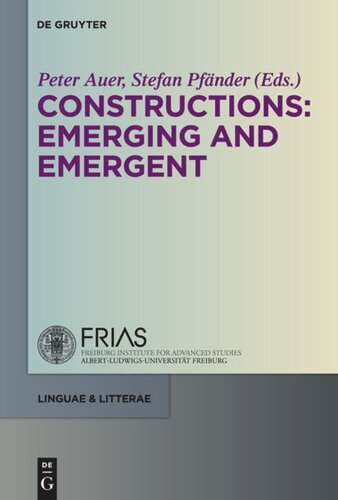

Most ebook files are in PDF format, so you can easily read them using various software such as Foxit Reader or directly on the Google Chrome browser.
Some ebook files are released by publishers in other formats such as .awz, .mobi, .epub, .fb2, etc. You may need to install specific software to read these formats on mobile/PC, such as Calibre.
Please read the tutorial at this link: https://ebookbell.com/faq
We offer FREE conversion to the popular formats you request; however, this may take some time. Therefore, right after payment, please email us, and we will try to provide the service as quickly as possible.
For some exceptional file formats or broken links (if any), please refrain from opening any disputes. Instead, email us first, and we will try to assist within a maximum of 6 hours.
EbookBell Team

5.0
18 reviewsThis volume embarks on an exploration of the processual and dynamic character of grammatical constructions in emergence, both from an ‘emergent’ and an ‘emerging’ perspective. ‘Emerging’ constructions develop out of their discourse contexts. Talking of emerging constructions is compatible with a view of grammar as a stable system of rules and structures which may ‘emerge’ (i.e., come into existence) out of a pool of previously unordered elements. ‘Emergent’ constructions on the contrary are due to the on-line production of grammar in time. The term ‘emergent’ emphasises the fact that a grammatical structure is always temporary and ephemeral. In both senses, grammar is modelled as a highly adaptive resource for interaction.
On the basis of empirical studies on spoken English, German, Hebrew, Swedish and French, the volume addresses the following questions: How can what initially appears to be construction x end up being construction y in on-line syntax? What are the local interactional needs which such processes respond to in the process of their emergence? Does the on-line (re-)modelling of a construction concern its syntactic or semantic side ‑ or both? And finally: Should emergent grammatical structures as they unfold in real time be seen as stages in the emerging of grammar?